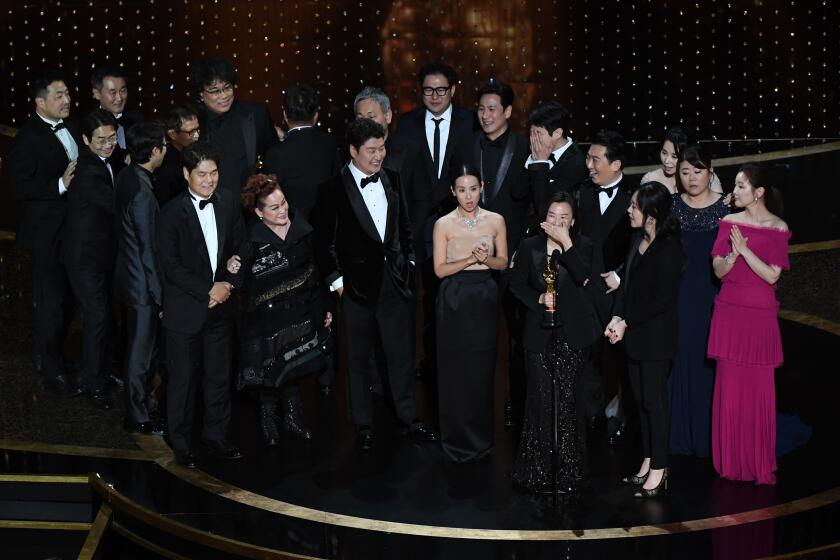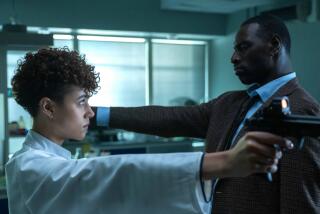Two decades later, a Korean action landmark still hits like a hammer
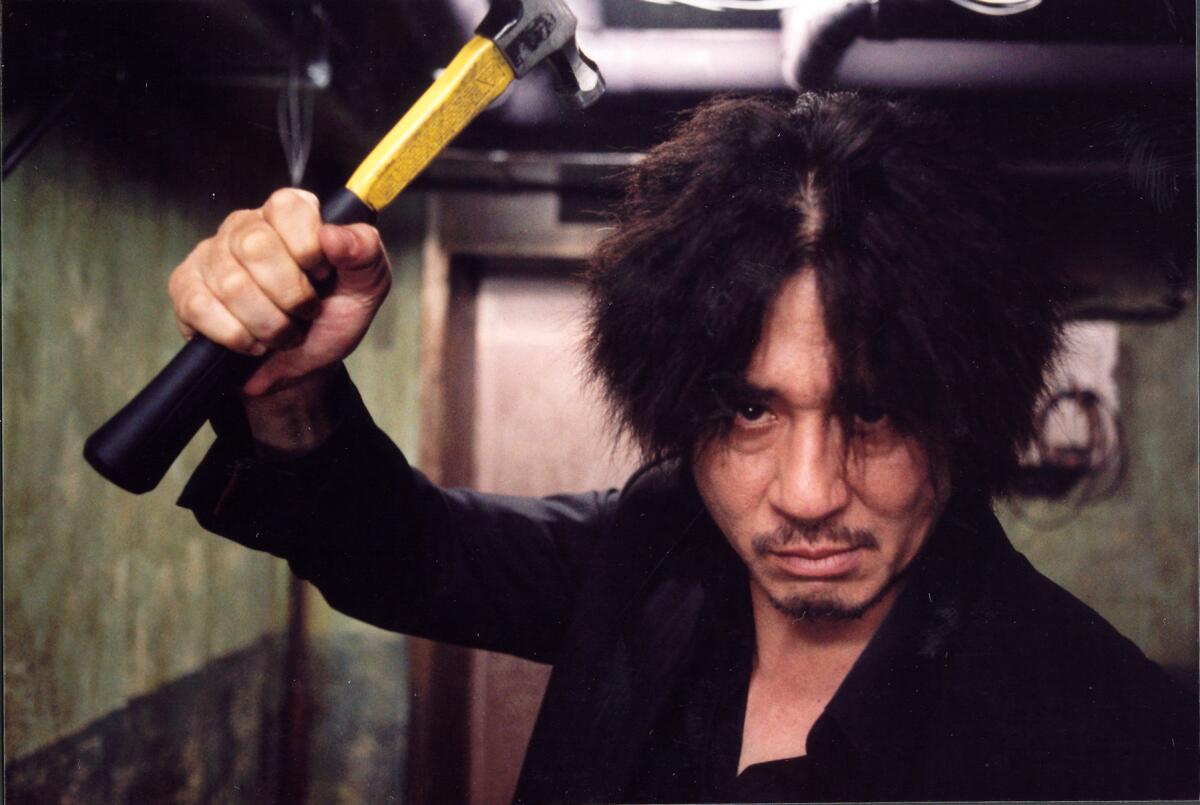
- Share via
It happened mere weeks before the COVID-19 lockdown, but it already feels like ancient history: When Bong Joon Ho’s biting class critique “Parasite” rode its critical wave all the way to a Best Picture Oscar in 2020, it was a watershed moment, not only for the international appeal of Korean movies but for all boundary-pushing films.
The foundation for that historic triumph, however, was laid 17 years earlier by the original K-cinema breakthrough, “Oldboy,” Park Chan-wook’s stylish 2003 revenge thriller. This week, Neon, the distribution company that released “Parasite,” brings “Oldboy” back to more than 200 American screens (including several in Los Angeles), restored and remastered to mark the 20th anniversary of its debut.
Riveting and off-putting in equal measure, “Oldboy” conjures up unforgettable images of violence. On paper, the plot is relatively simple: Mysteriously imprisoned for 15 years, Oh Dae-su (Choi Min-sik) seeks retribution from his captors once freed. Along a hellish journey for his pound of flesh, he’ll pull teeth straight from an adversary’s mouth, eat a live octopus raw (unfaked, alas) and fight a pack of henchmen solely with the blunt force of a hammer. And even after all that, a diabolical twist revealing an incestuous romantic affair is perhaps the film’s most gut-wrenching provocation.
The very idea that a blood-splattered genre film like “Oldboy” would play in competition at Cannes, months after its South Korean release, seemed like a fantasy. Its director had never had a film invited to the festival before.
But the enthusiastic support of that year’s jury president, Quentin Tarantino, a tastemaker then riding high on his double shot of “Kill Bill” movies, would catapult the brutal saga into the spotlight. While it missed out on the Palme d’Or (just barely, it is rumored), “Oldboy” would ultimately win the Grand Prix, the festival’s second most prestigious accolade.
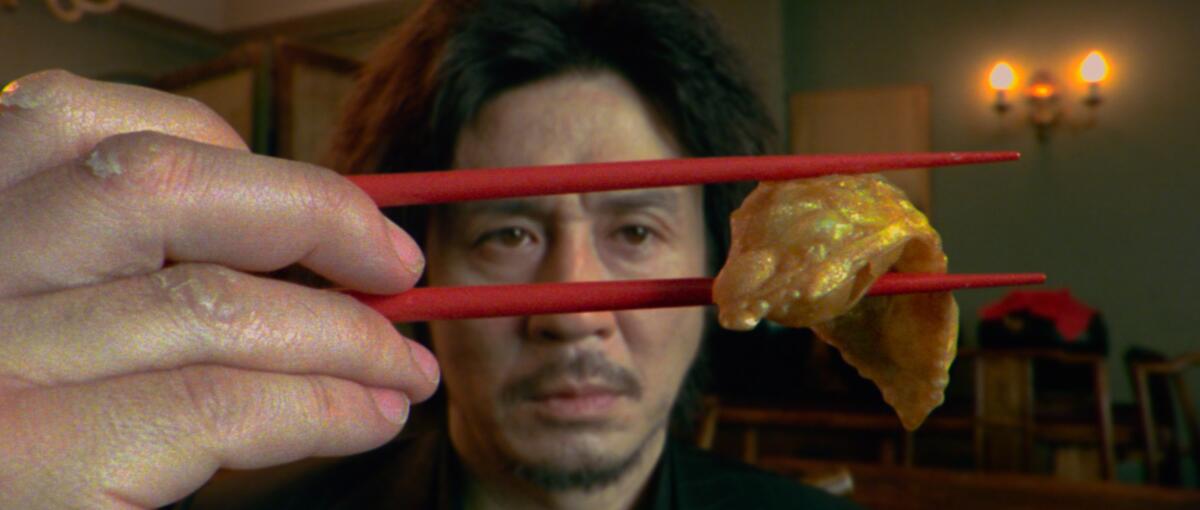
“When ‘Oldboy’ got that award from Cannes, everyone said, ‘We finally made it,’” recalls Sangjoon Lee, a Korean-born professor and author of the book “Rediscovering Korean Cinema.” “Many people even cried.”
Seoul-based American writer Darcy Paquet, author of “New Korean Cinema: Breaking the Waves”— which features a still from “Oldboy” on its cover — was on the Croisette that year and remembers the mixed response from festival attendees.
“Some people were turned off by the violence or the octopi scene and felt ‘Oldboy’ was too much of a genre film for competition,” he says. “People judge a film differently when it’s in competition as opposed to a midnight screening.”
On a recent video call, director Park explained that it wasn’t the incest that disgusted most audience members but the tongue-cutting and tooth-pulling scenes.
“Actually we don’t show that explicitly in the movie,” says Park. “They closed their eyes and imagined what had happened on the screen.”
For Park, emerging as a filmmaker in the 1990s during a moment of cultural loosening after decades of military rule, it was a time for transgression. “I reaped the benefits of not having censorship anymore, and that obviously influenced me as an artist as well,” he says.
Still, Park remembers that when producer Syd Lim first read the “Oldboy” script, he was flabbergasted at the movie’s ickiest revelation. And when the film was completed and investors saw a cut, they insisted Park remove it in postproduction. Ultimately, he won that battle.
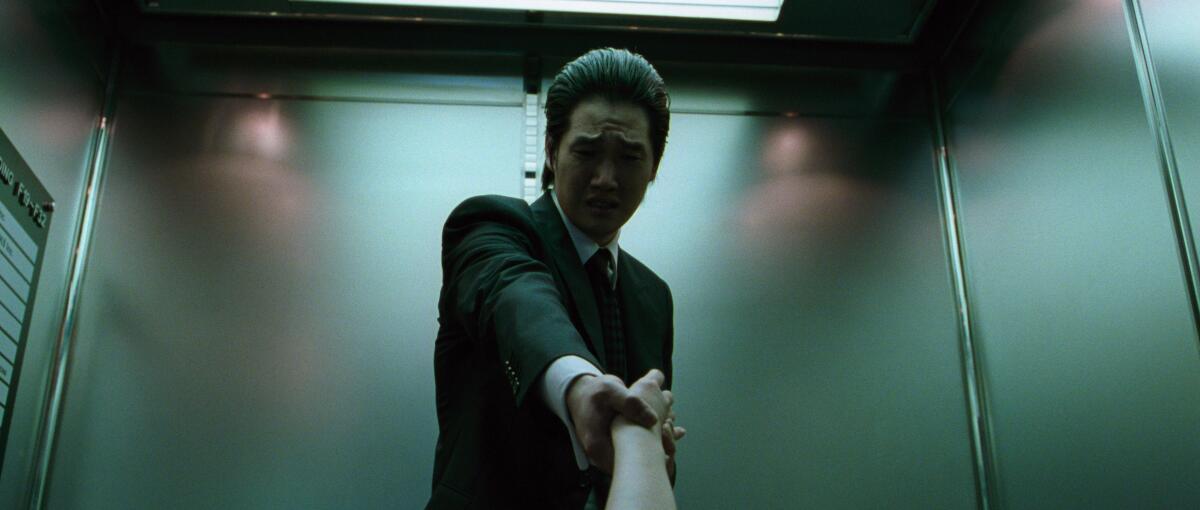
Once a film critic, Park speaks about his work with a certain pragmatic savvy.
“‘Oldboy’ provides an honest portrayal of mankind’s fundamental emotions and desires, and all of this was very much fiercely expressed,” says Park. “It really invigorates audiences’ senses — not just momentarily for the purpose of entertainment.”
With “Oldboy,” based on a manga that “Parasite” director Bong first recommended to him, Park ditched the elegant minimalism of his 2002 neo-noir “Sympathy for Mr. Vengeance,” instead diving into the nature of revenge with an instinctual immediacy that was easier to grasp. The hero of “Oldboy” doesn’t think much before he acts.
“It was quite obvious that this was a film made in its own mold,” says Hamish McAlpine, founder of the now-defunct distribution label Tartan, responsible for bringing to Western film fans such Asian horror gems as Takashi Miike’s “Audition” and Hideo Nakata’s “Ringu.” “A lot of the scenes from it, not just the corridor fight, really stayed with us.”
Tartan acquired “Oldboy” in November 2003, several months before Cannes, an obvious move for a company unafraid of “extreme” storytelling. Well suited to the tastes of English-speaking thrillseekers, “Oldboy” opened in U.K. cinemas in October 2004. McAlpine remembers having to lie to British censors about the infamous octopus-eating sequence, claiming the mollusks were already dead and that it was special effects that made them squiggle. Eventually, after weeks of negotiations, the film passed through uncut.
Later, when Tartan put out a special “Oldboy” box set that included a bottle opener in the shape of a full-size hammer, British retailers wouldn’t allow it on shelves, worried that a shoplifter might attack security staff.
“Oldboy” became Tartan’s highest-grossing film in the United States after opening in March 2005, following buzzy screenings at that year’s Sundance Film Festival. But why did this movie in particular captivate the attention of those previously unfamiliar with Korean cinema?
“Despite the shocking story, it clearly had the grammar of a typical genre film,” says Park. “It wasn’t too different for Western audiences. Also, this theme of revenge and incest is familiar in both the East and the West from older classics, for instance the Bible or Greek mythology.”
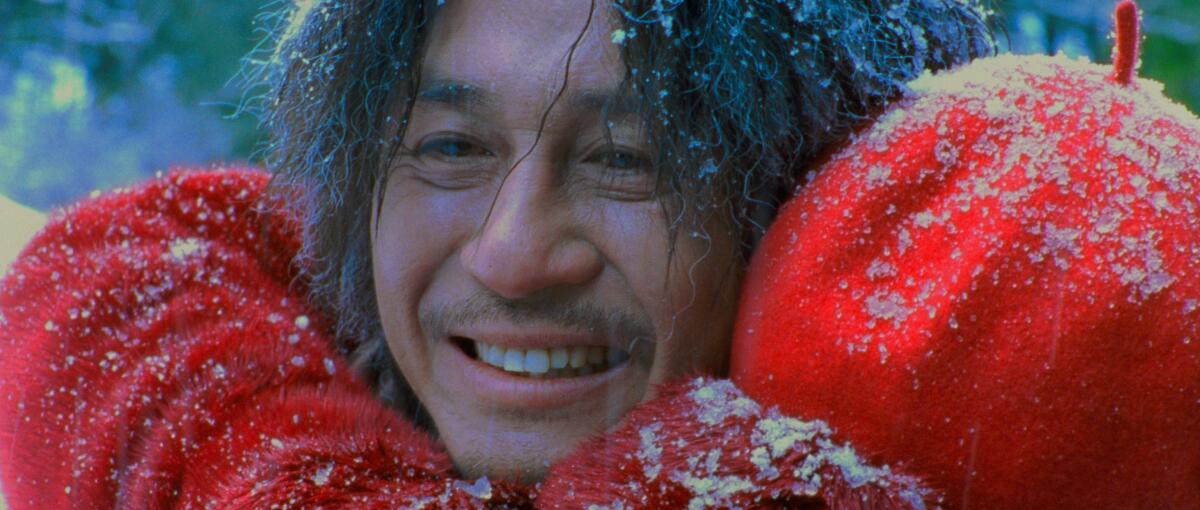
For a long time after it first knocked the air out of American viewers, “Oldboy” was a reference point for Korean cinema. It was the one Korean film “you could most reliably assume that a large number of people had seen abroad,” says Paquet.
It isn’t too far-fetched, he argues, to attribute to “Oldboy” some of the credit for the eventual triumph of “Parasite” on Hollywood’s biggest night.
“There’s a whole process of establishing a reputation for a national cinema,” Paquet says. “It’s not simply that a good film comes out of nowhere and then achieves the kind of success that ‘Parasite’ did.”
Park himself has never quite equaled the extremity of “Oldboy,” even as his work, such as 2016’s erotic psychodrama “The Handmaiden,” continues to receive accolades. He offers a sports analogy by way of explanation.
“As a batter, when you have this great hit rate, you have a lot of pressure to maintain or improve that hit rate for the next game as well,” Park says. “But I’m someone who considers my entire career as a filmmaker to be one single game. If I’ve had a home run for my turn here, then on my next turn, it’s OK if I get a strikeout.”
With “Parasite,” the academy gave best picture to the actual best picture. It also made history.
A generation later, scholars have the anecdotal evidence to suggest that “Oldboy’s” heat hasn’t dissipated.
“It’s still fresh,” says Lee. “Every time I teach Korean cinema, I always screen ‘Oldboy’ and no matter where I am — the U.S., South Korea, Hong Kong, Singapore — I always get a very enthusiastic response from students. It still resonates.”
“The intensity of the film remains just as strong today as it was 20 years ago,” agrees Paquet. “Park Chan-wook has gone on to have a great career, but this one stands out.” (Though not warmly received by critics, a 2013 English-language remake directed by Spike Lee speaks to the original’s enduring appeal.)
As for the indelible impact of “Oldboy” on Korean pop culture itself, the recent meta-comedy “I Haven’t Done Anything” from first-time director Park Sang-min, which opened in South Korean theaters last month, serves as a testament. It follows real-life actor Oh Tae-kyung (who appeared in some of “Oldboy’s” flashbacks) as a fictional version of himself, now down on his luck and a YouTuber. The satirical story features plenty of references to “Oldboy,” including that unfortunate octopus.
“Oldboy” director Park even has a cameo in the film. He remains confident in his film’s legacy, as only 20 years and a rerelease can afford.
“When the movie is over,” he says, “it provides an opportunity for an audience to reflect on the characters — and on life itself.”
More to Read
Only good movies
Get the Indie Focus newsletter, Mark Olsen's weekly guide to the world of cinema.
You may occasionally receive promotional content from the Los Angeles Times.
